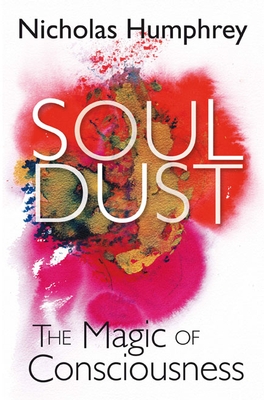Natural history of the soul
Brainscape 24 Susan AldworthIn his new book Soul Dust: The Magic of Consciousness, Nicholas Humphrey, a distinguished evolutionary psychologist and philosopher, claims to have solved two fairly large intellectual conundrums. One is something of a technical matter, about which you may have thought little or not at all, unless you happen to be a philosopher. This is the so-called “hard problem” of consciousness. The problem is how an entity which is apparently immaterial like the human consciousness – it exists, but you can’t locate it, much less measure it – can have arisen from something purely physical, like the arrangement of cells that make up the human body. The second problem Humphrey claims he has solved is a rather more everyday one, about which you may well have puzzled yourself. This is the problem of the soul. Does it exist? What sort of a thing might it be? Does everyone have one, even atheists?
His solution to both these problems is the same, because for him the strange properties of consciousness, the fact that for those of us that have it the world of dull matter is suffused with meaning, beauty, relevance and awe – means that it makes sense to think that we are permanent inhabitants of a “soul-niche” or “soul-world”. As the jacket blurb of his book has it, “consciousness paves the way for spirituality”, by creating a “self-made show” that “lights up the world for us, making us feel special and transcendent.” Consciousness and the soul are one and the same.
If this all sounds a little bit metaphysical or New Agey, too much like one of those tiresome attempts to bring religion and science into cosy alignment, hold fast. For what, on the face of it, looks like an attempt to validate spirituality using the language of science turns out to be a way to expand the domain of science by accounting for spirituality, and the soul, alongside consciousness in a fully materialist account. Soul Dust is nothing less than Humphrey’s attempt to sketch out a materialist theory of consciousness, and write a “natural history” of the soul. Within this schema conventional notions of the source or dimensions of the soul hardly register; religion doesn’t even rate a mention until page 199 and even then his tone is so disparaging as to leave you in no doubt that Humphrey’s version of the soul bears little resemblance to that of organised religion. This is why it is, at least potentially, of such interest for the godless. Humphrey is attempting to reclaim the soul for science.
Psychologist Nicholas Humphrey
I tracked Professor Humphrey down – running him to ground in the back of an art gallery as he prepared for his book launch – to find out why he wrote the book. “It’s meant to be a work of explanation. I started with two planks,” he told me, “what relatively little we know about the brain, and the theory of natural selection.” Thus he combined philosophy and neuroscience with what he has gleaned from a lifetime of experimental psychology. Though the detail is complex, the overall argument can be simply expressed. It has been assumed thus far that consciousness is such a conundrum that science can never unravel it. Humphrey quotes neuroscientists Francis Crick and Christof Koch on the intractability of the problem of how we can understand sensations like “the redness of red” or “the painfulness of pain”: “No one has produced any plausible explanation of how the experience of the redness of red could arise from the actions of the brain. It appears fruitless to approach this problem head-on.” In contrast Humphrey argues that in principle it should be possible for science to theorise what consciousness is, because it has been “seen” by natural selection. If we have it, the evolutionary logic goes, then it must in some way be useful, or at minimum a by-product of something that is useful, to have survived and in fact have flourished in humans. If natural selection can “see” the “physical basis” of consciousness in order to prefer it, then so, if we can develop the right conceptual armoury (something he acknowledges he has not fully achieved), can we. “Everything suggests,” Humphrey says, “that consciousness in all its glory has been designed, preferred through natural selection and amplified by evolution.”He offers an example of how his experiments have informed the project: the seven years he spent working with a monkey which had had its visual cortex removed. “When I first met her she was completely blind. I spent the next seven years teaching her to see again.” But how was this possible? “I teased her into thinking that she could see. She began to use a part of the brain that we all have (in the mid-brain visual system) but don’t use and don’t know much about. If you had seen her walking about you would have thought she was completely normal. However, when she was upset she would lose it and blunder around the room. She didn’t know she could see.”
Subsequently the idea was expanded by his supervisor at Oxford, Lawrence Weiskrantz, with human patients who had suffered brain injury leading to blindness or partial sight. Weiskrantz was similarly able to “teach” his patients to identify objects by shape and colour, in a field in which they were technically blind. This alerted Humphrey to the idea that there was a difference between perception (being able to see an object) and sensation (knowing you can see, having the sensation of seeing), and the insight that “you can have perception without sensation”. Which led him to the question: what, then, in an evolutionary sense, is sensation for? “My argument is that sensation came to serve lots of different functions including providing the qualitative dimensions of experience which we have come to enjoy in all the ways we do that aren’t just to do with knowing where we are or finding food.” Via some technical twists and turns – involving curious things like “feedback loops”, “attractor states” and the “Ipsenumdrum” – he produces the central claim of the first half of his book that a naturalist explanation of consciousness is possible, because it has evolved to be how it is.
The second half – less technical, more poetic and, as Humphrey admits, pretty speculative – is devoted to the question of why? What is it about consciousness, this “magical” ability to perceive and exult in beauty, meaning and a sense of awe, that confers an evolutionary advantage? His answer is simply that this magical show in our own heads which enchants the world is what makes life worth living: “For a phenomenally conscious creature, simply being there is a cause for celebration.” Consciousness infuses us with the belief that we are more than mere flesh, that we matter, that we might have a life after death, that we have a “soul”. All of these are illusions – the magic of his title – but they have real effects, by making us want to live. As for religion? In his book he argues, “Long before religion could begin to get a foothold in human culture human beings must already have been living in soul land.” “Yes,” he tells me, “I suggest that organised religion is parasitic on spirituality, and in fact acts as a restraint on it.”
As to how it will be received by the legion of philosophers, neuroscientists and psychologists with a stake in the issue of consciousness, Humphrey is wry. “I can’t say I’ve won the debate about this yet,” he concedes. While the book comes garlanded with praise from distinguished names – philosopher Simon Blackburn, neuroscientist VS Ramachandran – there has been a critical backlash. Philosopher Galen Strawson savaged the book in the Guardian, suggesting there simply was no hard problem to solve, and another philosopher, Mary Midgley, confirmed in her review for the Observer that Humphrey remains on her black list of reductionist scientists who think that science is the only way in which we can access the truth.
For my part, while I am not in a position to adjudicate on his science, I find the argument rather beautiful, and plausible, at least as an account of how we have acquired the idea of a soul. It has the added merit of foregrounding the wonderfulness of the world, and allowing the notion of a soul to anyone who’d like one. Is he, I wondered finally, actually trying to re-enchant the world? “No, I think the world is already enchanted by every one of us. I’m just trying to remind the world of that.”
Nicholas Humphrey’s Soul Dust: The Magic of Consciousness is published by Quercus (UK) - link goes to Amazon (US)
Offering multiple perspectives from many fields of human inquiry that may move all of us toward a more integrated understanding of who we are as conscious beings.
Wednesday, April 13, 2011
The Humanist - Soul Dust: The Magic of Consciousness by Nicholas Humphrey
At The Humanist, Caspar Melville meets with Nicholas Humphrey - author of Soul Dust: The Magic of Consciousness - who argues that spirituality is an essential element of consciousness. But he remains a confirmed materialist. Interesting interview, even though I disagree with Humphrey.
Tags:
Subscribe to:
Post Comments (Atom)



No comments:
Post a Comment